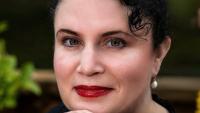February Narrative Medicine Rounds with Dr. Jennifer Natalya Fink
“All in the Family: Disability Lineage and the Future of Genetic Testing,” a conversation with Dr. Jennifer Natalya Fink moderated by Joseph Eveld.

Headshot Photo Credit: Damith Da Silva
For our first rounds of the spring semester, we had the privilege of welcoming Dr. Jennifer Natalya Fink, award-winning author and co-founder of Georgetown's Program in Disability Studies, who will be speaking about her recent book All Our Families: Disability Lineage and the Future of Kinship.
In All Our Families: Disability Lineage and the Future of Kinship, Dr. Jennifer Natalya Fink weaves together stories of members of her own family with sociohistorical research to illustrate how the eradication of disabled people from family narratives is rooted in racist, misogynistic, and antisemitic sorting systems inherited from Nazis. By examining the rhetoric of genetic testing, she shows that a fear of disability begins before a child is even born and that a fear of disability is, fundamentally, a fear of care. Dr. Fink analyzes our racist and sexist care systems, exposing their inequities as a source of stigmatizing ableism.
Inspired by queer and critical race theory, Dr. Fink calls for a lineage of disability: a reclamation of disability as a history, a culture, and an identity. Such a lineage offers a means of seeing disability in the context of a collective sense of belonging, as cause for celebration, and is a call for a radical reimagining of carework and kinship. All Our Families challenges us to re-lineate disability within the family as a means of repair toward a more inclusive and flexible structure of care and community.
Dr. Jennifer Natalya Fink is a professor of English at Georgetown University. She is also the co-founder, former director, and current core faculty in Georgetown's Program in Disability Studies. Dr. Fink is the author of seven award-winning books, including All Our Families: Disability Lineage and the Future of Kinship (Beacon: 2022). She has written about disability lineage and neurodiversity for the New York Times, the Atlantic, Teen Vogue, and many other mainstream press venues. An equally committed teacher and researcher, Dr. Fink received the Dean's Award for Teaching Excellence and the President's Award for Distinguished Scholar-Teachers. A lifelong learner, she recently completed a certificate from the Washington Baltimore Center for Psychoanalysis. Fink is a 2024 recipient of the Fulbright Peer Specialist award, and is currently at work on Neuropsyches: Neurodiversity, Narrativity, and the New Psychoanalysis.
Dr. Jennifer Natalya Fink was in conversation with Joseph Eveld, MS, MFA, Program Manager for the Division of Narrative Medicine and lecturer in creative writing and disability and illness narratives for the Narrative Medicine MS and Certificate programs.
As an adolescent, Joseph Eveld was diagnosed with an aggressive form of bone cancer called osteosarcoma and survived four years of treatments that included chemotherapy, fevers and infections, blood transfusions, bone scans, planned and emergency surgeries, and ultimately the amputation of his left leg. He turned to writing as a means to process this experience and adjust to a newly altered body, and developed a passion for caregiving from both the patient and provider perspective that ultimately lead him to narrative medicine.
While completing the Narrative Medicine Masters, Joseph studied Narrative Therapy and creative writing as applied in counseling for patients coping with trauma and terminal illness, as well as healthcare and social justice inequities represented in the literature and activism of indigenous cultures in the United States. Since graduating, he has developed a personal and scholarly focus on illness and disability experience and advocacy, creating educational workshops in disability awareness for Columbia University Irving Medical Center’s Interprofessional Education initiative and Kaiser Permanente’s School of Medicine. He is now a Lecturer for the core required course Illness & Disability Narratives: Embodiment, Community, Action for the MS in Narrative Medicine and served as Course Director for the Certificate program to develop and create a multidisciplinary course in literature and writing, Disability and Illness Narratives: Storytelling for Awareness and Activism. He has also taught fiction workshops and a literature seminar on Marginalized Voices & Self-Expression Through Poetry for medical students at Columbia’s Vagelos College of Physicians and Surgeons as part of their required foundational seminars in medical humanities.
Joseph also has a BA in English from Northeastern University, and completed his MFA in Fiction at the Creative Writing program at Boston University. He was a finalist for Glimmer Train Magazine’s Short Story Award for New Writers, he has poetry published in the Intima: A Journal of Narrative Medicine, and is currently working on his first novel.
Narrative Medicine Rounds are monthly rounds held on the first Wednesday of the month during the academic year, hosted by the Division of Narrative Medicine in the Department of Medical Humanities and Ethics at Columbia University Irving Medical Center. Rounds are supported by live captioning. If you have any other accessibility needs or concerns, please contact the Office of Disability Services at 212-854-2388 or disability@columbia.edu at least 10 days in advance of the event. We do our best to arrange accommodations received after this deadline but cannot guarantee them. A recording of this Virtual Narrative Medicine rounds will be made available temporarily following the live session only for those registered for the event but who are unable to attend during the live session, but we will not be offering an archived recording of this event. You can watch other recent Rounds events on the Narrative Medicine YouTube channel.

